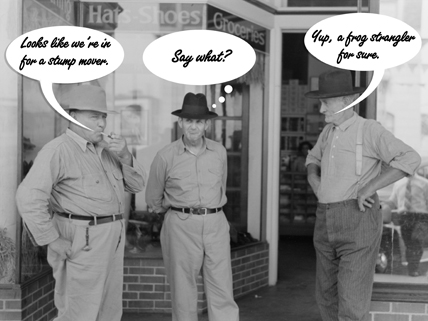As you read last month, Americans speak with a wide range of accents. They also use different words for the same things. These collections of words comprise American dialects, and experts at the University of Wisconsin have been keeping track of those dialects in a huge dictionary. Thousands of odd and wonderful words and phrases can be found in the Dictionary of American Regional English (DARE). The final volume, Sl through Z, of DARE has just been published.
These regionalisms describe many aspects of daily life. For example, what do you call a heavy rainstorm—a frog strangler, gully washer, or stump mover? What is the word for that old playground favorite—a ridy-bob or a seesaw? Do you pick up a bag of chips at a noshery or a snack bar? Many of the terms are delightful, such as “kiss-me-quick” for a sudden dip or rise in the road. And who could decline an invitation to a “toe social,” an event at which men picked their dance partners based on their bare feet, the women themselves hidden under sheets? Toe socials, however, are no longer bomb-diggity, frosty, coolio, or even groovy.
Mass culture has caused some words, though, to decline. Americans used to disagree over what to call a sandwich served on a long, narrow bun—hoagie, grinder, po’ boy, hero, submarine, or any one of the 13 names that have been recorded for it. Now, thanks to a certain fast-food chain, most of us call it a sub.
We promised to tell you what a wampus and a pinkletink have in common. They’re both animals, of course! A wampus may be either a real, rascally animal or a mythical cat-creature that stalks the South. A pinkletink is a young frog on the island of Martha’s Vineyard. Raise your hand if you knew that!
Image credit: © Library of Congress Prints & Photographs Division
Related Links
- Words from the Dictionary of American Regional English
This introductory article includes a fanciful illustration of a wampus!
(Source: Smithsonian Magazine, March 2012) - DARE (Dictionary of American Regional English)
Follow the links on the left of the page for a sample of 100 words or to see the list (under Index) of words from your state. Click on Educational Resources for audio samples, quizzes, and more.
(Source: University of Wisconsin; accessed March 31, 2012) - About the American Dialect Society
Explore this web site to learn about the work of the American Dialect Society, which has been active since 1889.
(Source: American Dialect Society; accessed March 31, 2012)





**raising hand**
Hahaha…. so true… This is a wicked ahsome ahticle! (I’m from Boston if you couldn’t tell 🙂
okaaaaaaaaaaaaaaay then
Hhahahahahahahaaa
Raised hand and still confused
I’m from the south I don’t understand any of that.